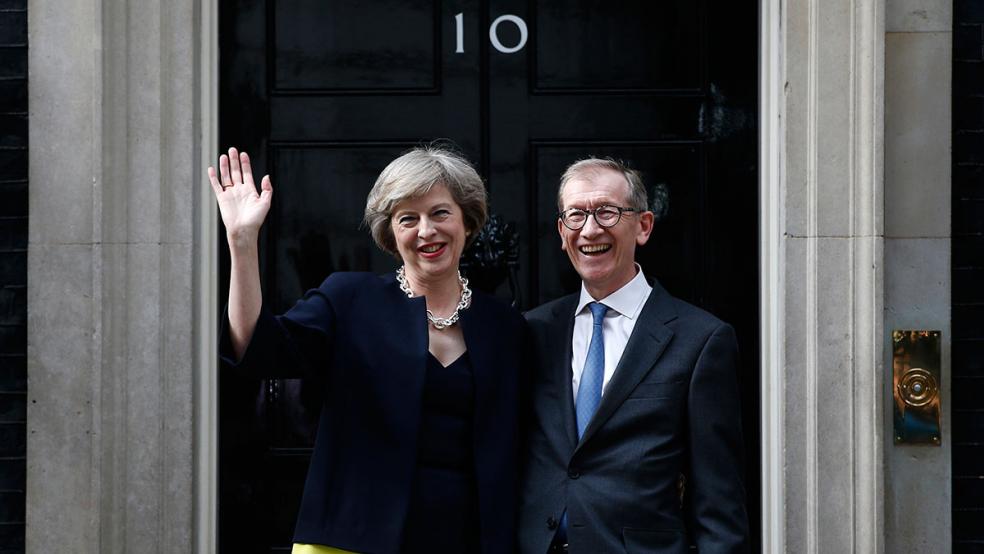The formal two-year process governing Britain's departure from the European Union (EU) began when Article 50 of the Treaty of Lisbon, which became law in 2009, was triggered on Wednesday.
Here, CNBC breaks down all the issues as the Brexit negotiations begin.
Related: Theresa May: 8 Things You Should Know About the UK’s New Prime Minister
What happens when Article 50 has been triggered?
A handwritten letter notifying the EU of the U.K.'s intention to leave was delivered to Donald Tusk, the president of the European Council, by Tim Barrow, the U.K.'s ambassador to the EU, at 1:30 p.m. Brussels time.
The multi-page letter traveled to Brussels overnight, accompanied by a civil servant and a guard. Specifics surrounding exactly how and where Barrow met Tusk, as well as his planned route for getting to the preordained meeting point, were reportedly kept quiet for fear of impassioned Remain campaigners possibly attempting to intercept the letter and disrupt the timing of the agreed plan for this historic event.
Tusk has previously said the EU is ready to respond within 48 hours of obtaining the notification.
The two-year time limit can be extended with the unanimous consent of both the U.K. government and the European Council, which consists of the leader of each of the 27 member states remaining within the EU post-Brexit.
The deal will also be put forth for approval in each member state's respective national parliament, which could potentially slow down the process should certain lawmakers object to particular conditions. Any deal must be approved by a "qualified majority" of EU member states and the European Parliament retains the right to a veto.
Related: Britain’s Tarnished Sterling: A Global Warning for Theresa May on Brexit
What will the Article 50 achieve once completed?
Article 50 simply provides a path for the process by which the U.K. will exit the EU. Once the withdrawal agreement – enacted within the U.K. by the Great Repeal Bill which will end the primacy of EU law within the country - comes into force, the EU treaties will no longer apply to the U.K. Following that, all of the permanent new terms governing the relationship going forward between the two sides will have to be negotiated and agreed. During this time, the government will decide which parts to retain, modify or cut. Some estimate this could take several more years.
What if there is 'no deal' agreed with the EU within the two-year exit process?
The "deal" refers to the terms governing the new post-Brexit relationship between the EU and U.K. of which a trade agreement is the critical centerpiece. If no new deal is agreed before the U.K. leaves the EU, trading terms will default to the World Trade Organization (WTO) standards which are significantly less beneficial for both sides.
What powers does the UK Parliament have during the Brexit process?
The U.K. Parliament will have the right to veto the final deal but not to suggest amendments to it, effectively leaving politicians with a "take-it-or-leave-it" option.
When are official talks between the UK and EU expected to begin?
Some believe that official Brexit talks could begin on April 29 at the next planned summit bringing together the leaders of the 27 remaining EU member states in Brussels.
What are the biggest issues on the table?
The key topics are set to be the exit bill the U.K. is required to pay to the EU for the price of leaving, rights for EU citizens to remain within the U.K. following Brexit and vice-versa, the future freedom of movement for, above all, people and goods and the complicated political situation between Northern Ireland and the Republic of Ireland.
How does the timeline fit into the UK general election cycle?
The next general election in the U.K. is scheduled for May 7, 2020. Should the U.K. successfully exit the EU within the designated two years from the triggering of Article 50, the process should be completed by April 2019, leaving around a year for campaigning ahead of the next election.
How did markets react ahead of the trigger?
Strong chatter anticipating that U.K. Prime Minister Theresa May would trigger Article 50 on March 29 emerged on the weekend of March 11/12. When markets opened on Monday March 13, both sterling and the U.K.'s FTSE 100 equity index rallied, with commentators suggesting that there was relief among investors that the process – now largely viewed as inevitable despite continued calls from certain high profile figures for the decision to be reversed – was finally getting underway. The FTSE 100 and the mid-cap FTSE 250 index both closed higher on Tuesday March 28, prior to the trigger being pulled on Wednesday while the British currency finished lower against the U.S. dollar.
This article originally appeared on CNBC. Read more from CNBC:
Trump plans two new trade-related executive orders: senior official
In a decade, many fast-food restaurants will be automated, says Yum Brands CEO
China's secret plan to crush SpaceX and the US space program




